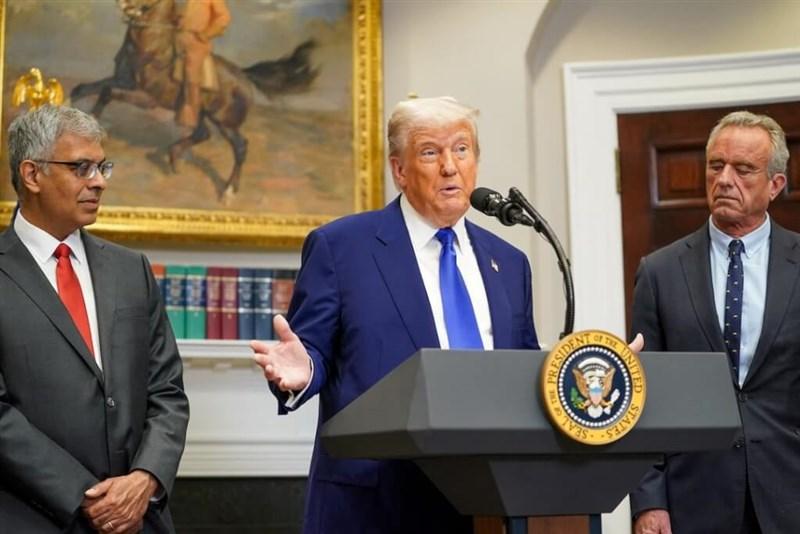The US Department of State yesterday reaffirmed that US policy on Taiwan has not changed after US President Donald Trump used the word “unification” while commenting on recent trade talks with China.
At a wide-ranging press conference yesterday, Trump spoke about what he believed were the gains made by US trade talks with China in Geneva over the weekend.
“They’ve agreed to open China — fully open China. And I think it’s going to be fantastic for China. I think it's going to be fantastic for us,” Trump said, “I think it’s going to be great for unification and peace.”

Photo: Reuters
Trump’s use of the word “unification,” almost always used in the context of China unifying or annexing Taiwan, raised eyebrows in Taiwan.
The US Department of State said that Trump had not been referring to Taiwan.
“It's clear President Trump was speaking in the context of the US-China trade relationship,” a department spokesperson told CNA yesterday.
Just before using the term “unification” in his remarks yesterday, Trump lamented the falling through of a trade deal with China during his first term that he said “would have brought unity, better unity, between China and the US,” perhaps indicating that he misused the term “unification.”
The department also reiterated that “US policy on Taiwan remains the same.”
“We continue to have an abiding interest in peace and stability across the Taiwan Strait,” it said, adding that the US “opposes any unilateral changes to the status quo by either side.”
The Ministry of Foreign Affairs responded to Trump’s comment by echoing the department’s contention that it was made in a trade context.
“According to our understanding, the Taiwan issue was not touched on during the latest round of US-China trade negotiations,” said ministry spokesperson Hsiao Kuangwei (蕭光偉) during a ministry weekly briefing today.
Trump’s comments followed two days of talks in Switzerland between the world’s two largest economies, during which the two sides agreed to ease their tit-for-tat battle over tariffs.
Under the preliminary agreement, the US would lower tariffs on Chinese imports from 145 percent to 30 percent, while China would reduce levies on US goods from 125 percent to 10 percent.

Chinese spouse and influencer Guan Guan’s (關關) residency permit has been revoked for repeatedly posting pro-China videos that threaten national security, the National Immigration Agency confirmed today. Guan Guan has said many controversial statements in her videos posted to Douyin (抖音), including “the red flag will soon be painted all over Taiwan” and “Taiwan is an inseparable part of China,” and expressing hope for expedited reunification. The agency last year received multiple reports alleging that Guan Guan had advocated for armed reunification. After verifying the reports, the agency last month issued a notice requiring her to appear and explain her actions. Guan

GIVE AND TAKE: Blood demand continues to rise each year, while fewer young donors are available due to the nation’s falling birthrate, a doctor said Blood donors can redeem points earned from donations to obtain limited edition Formosan black bear travel mugs, the Kaohsiung Blood Center said yesterday, as it announced a goal of stocking 20,000 units of blood prior to the Lunar New Year. The last month of the lunar year is National Blood Donation Month, when local centers seek to stockpile blood for use during the Lunar New Year holiday. The blood demand in southern Taiwan — including Tainan and Kaohsiung, as well as Chiayi, Pingtung, Penghu and Taitung counties — is about 2,000 units per day, the center said. The donation campaign aims to boost

The Kaohsiung Tourism Bureau audited six hotels in an effort to prevent price gouging ahead of Korean band BTS’ concert tour in the city scheduled for Nov. 19, 21 and 22 this year. The bureau on Friday said that the audits — conducted in response to allegations of unfair pricing posted on social media — found no wrongdoing. These establishments included the local branches of Chateau de Chine, Hotel Nikko, My Humble House, and Grand Hai Lai, it said, adding that the Consumer Protection Commission would have penalized price gougers had the accusations been substantiated. The bureau said the Tourism Development Act

BACK TO WINTER: A strong continental cold air mass would move south on Tuesday next week, bringing colder temperatures to northern and central Taiwan A tropical depression east of the Philippines could soon be upgraded to be the first tropical storm of this year, the Central Weather Administration (CWA) said yesterday, adding that the next cold air mass is forecast to arrive on Monday next week. CWA forecaster Cheng Jie-ren (鄭傑仁) said the first tropical depression of this year is over waters east of the Philippines, about 1,867km southeast of Oluanpi (鵝鑾鼻), and could strengthen into Tropical Storm Nokaen by early today. The system is moving slowly from northwest to north, and is expected to remain east of the Philippines with little chance of affecting Taiwan,